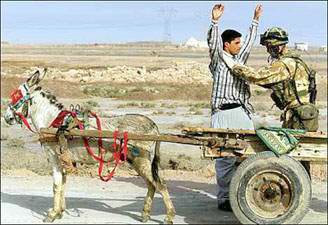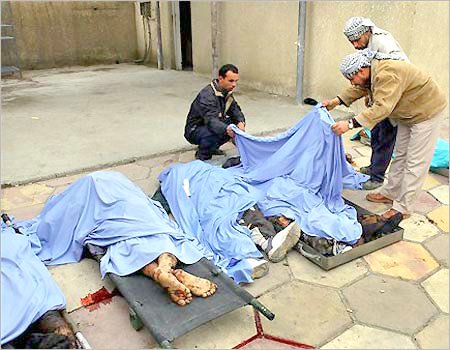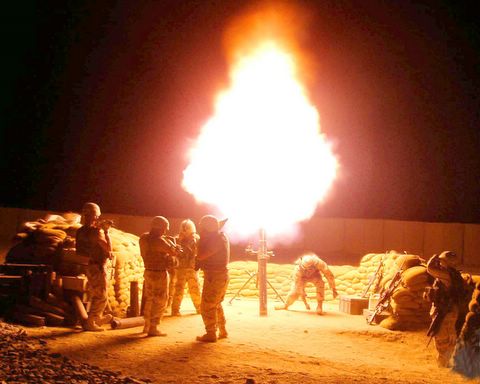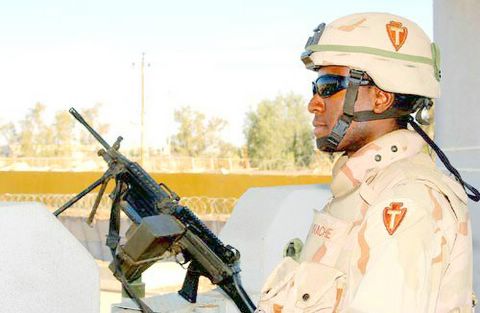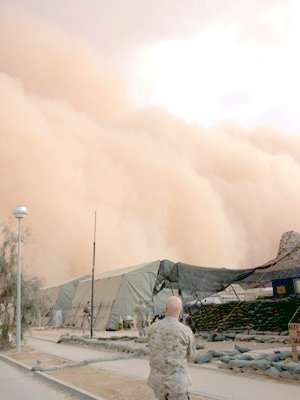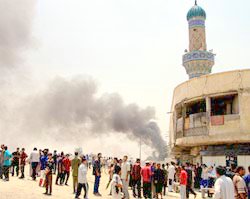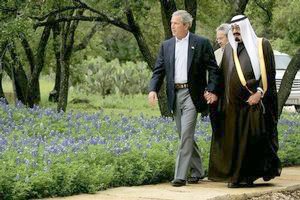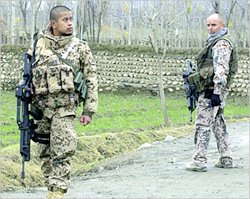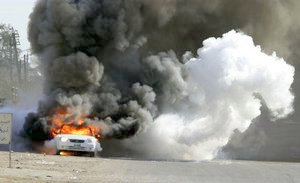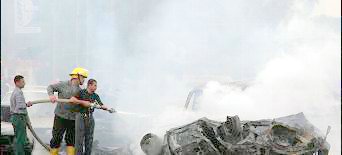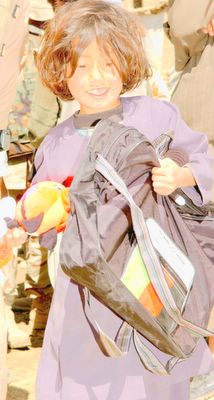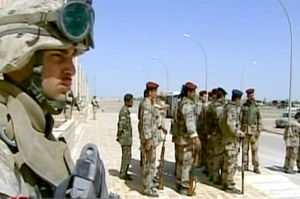Saturday, April 30, 2005

U.S. Army Sgt. William J. Hartman stands watch over a pit full of Iraqi mortar rounds waiting to be destroyed by a civilian explosive ordnance disposal team at the Akudar Ammunition Depot located in central Iraq. Hartman is assigned to the 3rd Battalion, 112th Armored Regiment, 56th Brigade Combat Team, 36th Infantry Division. U.S. Army photo by Pvt. Tony Montez More Photos
Texas Guard Soldiers Patrol Deadly Grounds
Soldiers of the 56th Brigade Combat Team guard a desolate desert area strewn with unexploded ammunition to keep it out of the hands of insurgents.
By U.S. Army Master Sgt. Lek Mateo, Texas National Guard 56th Brigade Combat Team Public Affairs Office �The security mission that we perform is very important because we prevent the insurgents from getting their hands on the explosives to make (improvised explosive devices) so that they cannot harm other soldiers or civilians,� Mouton said. Sgt. 1st Class James J. Evrard, of Austin, Texas, acknowledged that the soldiers� living conditions are austere and dangerous because of the tons of old and unstable land mines, artillery shells and mortar rounds stored within the site. Nevertheless, they have come to call the dangerous playground their temporary home. Evrard knows that guard duty can be boring for his soldiers, who are tank crewman accustomed to going into combat with their M1A1 Abrams main battle tank. But he stressed to his soldiers that by keeping the ammunition out of the insurgent�s hands they are helping to save American lives. �We have a lot of ammunitions out here that the insurgents would like to use to build (improvised explosive devices),� Evrard said. �We are here to prevent that.� Spc. Michael E. Langley, of Engleton, Texas, said that this is his first overseas deployment and that it was interesting for him to see how much ammunition is stored at the facility. The specialist said he and his team members are well aware of the dangers that are hidden in the desert sand below their feet every time they go out and patrol the perimeter to prevent people such as local Bedouins from wandering onto the site. �There is a rule that we all live by, especially at night,� Specialist Langley noted. �That rule is that you do not get off the trail with your vehicle because of (unexploded ordnance).� The specialist added that he and the other soldiers take their job seriously and know that they are helping to save lives. �I definitely think that this is a vital mission,� Langley said. �I would rather us be out here guarding this munitions than have one of the rounds taken away and be used against our soldiers.�
AKUDAR, Iraq, April 26, 2005 � Texas Army National Guardsmen play a deadly game of Russian Roulette every time they go to work because the sandy ground that they patrol is strewn with unexploded ammunition. The soldiers, who are members of 3rd Battalion, 112th Armored Regiment, 56th Brigade Combat Team, 36th Infantry Division, are tasked with the huge job of guarding the remnants of a large ammunition storage depot located in the desolate desert of central Iraq. The depot houses tons of ammunition slated to be destroyed by specially trained civilian contractors.
�We have a lot of ammunitions out here that the insurgents would like to use to build (improvised explosive devices). We are here to prevent that,� U.S. Army Sgt. 1st Class James J. Evrard Printer-friendly Version
Although the area is remote and the hours are long and monotonous, the soldiers maintain their vigilance in keeping intruders out of the dangerous area. They realize that the deadly cargo stored here can be used to make improvised explosive devices to harm other soldiers and innocent civilians. U.S. Army1st Lt. David E. Moulton, of Houston, Texas, knew that he and his men had a challenge ahead of them when they first saw the vast, fenceless complex that stretches more 50 kilometers. �When we first got here, we saw a lot of ammunitions all over the place,� Moulton said. �Everywhere you drove you saw UXO [unexploded ordnance] on the ground scattered throughout the area.� He said he reminds his soldiers constantly not to drive off the traveled roads and to drive only on the pre-designated paths. Otherwise they might roll over unexploded ordnance and set it off. The lieutenant emphasized that the mission is not as glamorous as other combat missions, but the responsibility that he and his men have been assigned is vital and that they are doing a small part to battle against the insurgents. Email A Copy
Ballistic Missile Defense | Defense Department Overview | Joint Chiefs of Staff CENTCOM | EUCOM | JFCOM | NORAD | NORTHCOM | PACOM | SOCOM | STRATCOM | SOUTHCOM | TRANSCOM Maps | Recruiting | Today's Military | DoDBusOpps Home | Privacy & Security
Friday, April 29, 2005
Car Bombs Rock Baghdad; U.S. Soldiers Killed in Separate Incidents
American Forces Press Service
WASHINGTON, April 29, 2005 – Several car bombs have rocked Baghdad, Iraq, today, and elsewhere another car bomb killed a U.S. soldier.
Multiple car bombs in and around Baghdad today killed at least 24 Iraqis and wounded at least another 80, according to news sources. Reports say that the wounded were mostly police and military patrols.
"While there has been an overall downward trend in attacks since elections, terrorists have still proven they can execute or surge their capability to conduct limited attacks," a Multinational Force Iraq spokesman said in a statement.
Coalition officials see the string of attacks "as another desperate attempt by the terrorists to discredit the newly formed Iraqi government," the spokesman noted.
"The attacks today, mostly directed against innocent Iraqi civilians, perpetuate the terrorists' failing attempts to drive a wedge between the Iraqi people and their right to choose their own destiny," the spokesman added.
Also today, a separate car-bomb attack killed a U.S. Army soldier from the 1st Corps Support Command. Two other soldiers were wounded in the attack, which occurred miles north of Taji.
The three soldiers were evacuated to the theater hospital at Logistics Support Area Anaconda, where one died. The other two soldiers are being treated at the hospital.
The previous evening, an improvised explosive device detonation near Hawija killed one U.S. soldier from Task Force Liberty and wounded four others. The wounded soldiers were evacuated to a coalition medical facility and are in stable condition.
The names of the soldiers killed and wounded are being withheld pending notification of their families.
Elsewhere in Iraq, coalition forces from 1st Brigade, 25th Infantry Division (Stryker Brigade Combat Team), detained six suspected terrorists and seized a number of weapons during operations in northern Iraq on April 28.
Soldiers from 1st Battalion, 5th Infantry Regiment, detained three individuals suspected of terrorist activity following an attack on their patrol in southern Mosul. The soldiers also identified a weapons cache while conducting search operation in the same area. The weapons were confiscated for future destruction.
Soldiers from 1st Battalion, 24th Infantry Regiment, detained two individuals suspected of terrorist activity after they stopped the individuals' vehicle in southern Mosul. The soldiers also detained another individual suspected of terrorist activity during a raid in western Mosul. The suspects are in custody, and no injuries to coalition force were reported.
American Forces Press Service
WASHINGTON, April 29, 2005 – Several car bombs have rocked Baghdad, Iraq, today, and elsewhere another car bomb killed a U.S. soldier.
Multiple car bombs in and around Baghdad today killed at least 24 Iraqis and wounded at least another 80, according to news sources. Reports say that the wounded were mostly police and military patrols.
"While there has been an overall downward trend in attacks since elections, terrorists have still proven they can execute or surge their capability to conduct limited attacks," a Multinational Force Iraq spokesman said in a statement.
Coalition officials see the string of attacks "as another desperate attempt by the terrorists to discredit the newly formed Iraqi government," the spokesman noted.
"The attacks today, mostly directed against innocent Iraqi civilians, perpetuate the terrorists' failing attempts to drive a wedge between the Iraqi people and their right to choose their own destiny," the spokesman added.
Also today, a separate car-bomb attack killed a U.S. Army soldier from the 1st Corps Support Command. Two other soldiers were wounded in the attack, which occurred miles north of Taji.
The three soldiers were evacuated to the theater hospital at Logistics Support Area Anaconda, where one died. The other two soldiers are being treated at the hospital.
The previous evening, an improvised explosive device detonation near Hawija killed one U.S. soldier from Task Force Liberty and wounded four others. The wounded soldiers were evacuated to a coalition medical facility and are in stable condition.
The names of the soldiers killed and wounded are being withheld pending notification of their families.
Elsewhere in Iraq, coalition forces from 1st Brigade, 25th Infantry Division (Stryker Brigade Combat Team), detained six suspected terrorists and seized a number of weapons during operations in northern Iraq on April 28.
Soldiers from 1st Battalion, 5th Infantry Regiment, detained three individuals suspected of terrorist activity following an attack on their patrol in southern Mosul. The soldiers also identified a weapons cache while conducting search operation in the same area. The weapons were confiscated for future destruction.
Soldiers from 1st Battalion, 24th Infantry Regiment, detained two individuals suspected of terrorist activity after they stopped the individuals' vehicle in southern Mosul. The soldiers also detained another individual suspected of terrorist activity during a raid in western Mosul. The suspects are in custody, and no injuries to coalition force were reported.

At least 10 car bombs have exploded in Iraq a day after the country formed a new government.
The string of deadly blasts on Friday killed at least 20 people and wounded 90 in and around Baghdad and al-Madain. The attacks targeted the Iraqi police and army, but also claimed the lives of civilians.
The attacks came a day after parliament voted in the new government of Prime Minister Ibrahim al-Jafari, which left several jobs vacant, including the powerful oil and defence ministries.
Thirteen people died and 50 were wounded in four apparently coordinated car bomb attacks in two districts of the capital at about 8am (0400 GMT), the official said.
Five more people died and 14 were wounded when three more car bombs exploded in al-Madain, a town 30km south of the capital that was swept only 10 days ago by the Iraqi army in search of fighters.
Two of the Baghdad blasts targeted Iraqi police forces and the army in the northern district of al-Adhamiyah. Adding to the chaos, fighters fired several mortar shells into the area at the same time, the interior ministry official said.
Two other car bombs targeted police in the eastern district of al-Salikh.
Walid Khalid, an Iraqi journalist, told Aljazeera the car bombs in al-Adhamiyah exploded within 10 minutes of one another.
He said the first bomb exploded in Antar Square hitting an Iraqi police two-vehicle patrol. Two people were killed in the attack and four injured.
Police targeted
A second car bomb targeting an Iraqi National Guards patrol near the Qasim Abu al-Qat restaurant, killed two policemen and two national guards.

COL Polik from the Polish CIMIC(civilian military corpation) unit, greets two grils during a cermony commemorating the completion of a new Medical Clinic on April 27th 2005, in AL Diwaniyah, Iraq. The CIMIC conducts various projects that aid the rebuilding of the Iraqi infrstructure.U.S. Army Photo by SGT Hamilton, Arthur

FAREWELL CEREMONY� Deputy Defense Secretary Paul Wolfowitz, right, is escorted by Commander of Troops Col. Chuck Taylor as he inspects the honor guard during his farewell ceremony on the Pentagon River Parade Field, April 29, 2005. Defense Secretary Donald H. Rumsfeld presented Wolfowitz with the Department of Defense Medal for Distinguished Public Service. Wolfowitz is leaving the Defense Department to become president of the World Bank. Defense Dept. photo by R. D. Ward Hi-Res Photo
Wednesday, April 27, 2005

SAQLAWIYAH, Iraq Maj. Chris E. Phelps, 1st Battalion, 6th Marine Regiments civil affairs team leader, shakes hands with some local farmers while patrolling alongside Company A, 1st Battalion, 6th Marine Regiment personnel here. Civil affairs Marines are conducting assessments on the community here to determine what utilities and services the local population needs. Photo by: Cpl. Mike Escobar
hi-res
Tuesday, April 26, 2005

STORMY WEATHER A dust storm which originated near the Syrian-Jordanian border swept across Iraq's western desert April 26, 2005. U.S. Marine Corps weather forecasters stationed at Al Asad, Iraq, described the dust storm as a downburst. The storm passed over in about 45 minutes, leaving a heavy sheet of dust in its wake. Forecasters say the wall of dust may have reached 4,000 to 5,000 feet, based on the height of the clouds above it. U.S. Marine Corps photo by Gunnery Sgt. Shannon Arledge
Hi-Res Photo | Story

PVT Michael Vanskoyck provides cover for members of the 2nd/11th Armored Cavalry Regiment (ACR) as they conduct a raid on the Hateen Weapons Complex near Babil, Iraq, as part of an operation to disrupt insurgent safe havens and to clear weapons cache locations. US Navy photo by Chief Photographer's Mate Edward Martens. 050326-N-6501M-006 (Released)
Iraq Dragnet Snags 18 Suspects; Detainee Dies at Hospital
American Forces Press Service
WASHINGTON, April 25, 2005 – Coalition forces captured 18 suspected terrorists during a search-and-seizure operation conducted April 22-24 in Babil province, Iraq. Elsewhere, a security detainee died at a U.S. military hospital.
Operation Philadelphia, which concluded April 24, was conducted to prevent terrorists from mounting attacks in Multinational Division Central-South’s area of operations and to secure stability for Iraqis living in Babil province.
Eighteen people were detained as a result of the operation, including one person on a list of wanted terrorists who’d previously attacked coalition forces. More than four hundred coalition soldiers participated in the operation.
Also in Iraq, a 20-year-old security detainee was receiving medical care at the U.S. 115th Field Hospital when he died April 24. The detainee died of complications resulting from gunshot wounds received two weeks ago while engaging coalition forces.
The detainee’s remains will be transferred to his family after an autopsy is completed. An autopsy is standing procedure for all detainees who die in Multinational Force Iraq custody.
(Compiled from Multinational Force Iraq press
American Forces Press Service
WASHINGTON, April 25, 2005 – Coalition forces captured 18 suspected terrorists during a search-and-seizure operation conducted April 22-24 in Babil province, Iraq. Elsewhere, a security detainee died at a U.S. military hospital.
Operation Philadelphia, which concluded April 24, was conducted to prevent terrorists from mounting attacks in Multinational Division Central-South’s area of operations and to secure stability for Iraqis living in Babil province.
Eighteen people were detained as a result of the operation, including one person on a list of wanted terrorists who’d previously attacked coalition forces. More than four hundred coalition soldiers participated in the operation.
Also in Iraq, a 20-year-old security detainee was receiving medical care at the U.S. 115th Field Hospital when he died April 24. The detainee died of complications resulting from gunshot wounds received two weeks ago while engaging coalition forces.
The detainee’s remains will be transferred to his family after an autopsy is completed. An autopsy is standing procedure for all detainees who die in Multinational Force Iraq custody.
(Compiled from Multinational Force Iraq press
Monday, April 25, 2005
Sunday, April 24, 2005

3-116 Inf. air assaults into Wardak province
By Staff Sgt. Bradley Rhen, CTF Thunder Public Affairs Office
<26a_hires.jpg>
<26a_hires.jpg>WARDAK PROVINCE, Afghanistan As the sun peeked over the mountains early on the morning of April 15, three CH-47 Chinook helicopters packed with U.S. and Afghan Soldiers sped toward their target in Wardak province.
When the helicopters landed, the Soldiers raced out the back ramps. While the Afghan National Army Soldiers formed a perimeter around the compound, Soldiers from 3rd Battalion, 116th Infantry Regiment from the Virginia Army National Guard searched for three men suspected of having ties to the Taliban.
The men were not home at the time, and thus evaded capture. However, the Soldiers were able to locate and confiscate some weapons, and they gained valuable intelligence during questioning of others.
The air assault mission was the first mission of Operation Vigilance. The operation was expected to last several days and included humanitarian aid drops in several villages, said Lt. Col. Blake Ortner, commander of 3rd Bn., 116th Inf. Rgt.
The objective this morning was we were going after three targeted individuals that we were trying to kill or capture, Ortner said. From here on out, well have some additional targeted operations, but also a lot of patrolling and other operations within Wardak to set conditions for the future.
Due the large amount of snow this past winter and the bad road conditions, the mission was delayed several time, Ortner said.
This was essentially an operation we wanted to kick off to disrupt any of the spring attacks that may be going on up here, Ortner said. We seem to have a larger threat up in Wardak than we do in other areas, so we wanted to kind of preempt some of that.
The mission came nine days after a CH-47 Chinook helicopter crashed in Ghazni, killing all 18 people aboard. Many of the Soldiers who took part in the Operation Vigilance mission are based at Forward Operating Base Ghazni, which is just a few miles from the crash site, and participated in the recovery effort of the crashed helicopter.
Specialist Robert Mumaw, an M249 Squad Automatic Weapon gunner with Company B, 3rd Bn., 116th Inf. Rgt., said the crash weighed on a lot of Soldiers minds.
We saw that first-hand, so that was probably the biggest worry, not going in and doing the actual mission, he said.
Mumaw, a native of Woodstock, Va., said once he hit the ground, those worries disappeared and he was able to focus on the mission at hand.
The entry went well, it went quick, Mumaw said. We put the females in one room, segregated the males, and had the female MP search the females.
Munaw said they found 17 to 20 RPGs, about 200 rounds of 7.62 mm ammunition, a few AK47s and a few grenades. Additionally, they found large <26b_hires.jpg>
<26b_hires.jpg>amounts of cash on the women.
Wardak province is located southwest of Afghanistans capital, Kabul. Because of its proximity to the capital along with the fact that Ring Road Afghanistans lone major highway that connects several of the countrys biggest cities passes through the eastern part of the province, Ortner said a Coaliton presence in the province is important.
In the past, the Coalition has not had a significant presence in the province, Ortner said, but thats something hes working to change.
Our big intent was to get up here and really get a feel for the area, he said. We wanted to get a lot of patrols out to a lot of villages and try to build confidence in the people.
For Mumaw and his fellow infantrymen, the operation was a chance to get their boots muddy.
Coming into the deployment last year, many Soldiers from the battalion didnt really know what to expect coming here. Some of them have found themselves pulling guard duty in towers at Bagram Airfield.
Infantry just aint used to getting stuck in towers, he said. This is what were supposed to do.
Saturday, April 23, 2005

First Class of Highway Patrol Academy Heads for Iraqi Streets
TAJI, IRAQ With cheers and chants of loyalty to the new Iraqi government, 247 exuberant recruits picked up graduation certificates from the Iraqi Highway Patrol Academy April 7 and headed for new jobs guarding their countrys streets and thoroughfares.
This was the first class to graduate from the new academy. Before the ceremony even began, the first wave of highway patrol officers was celebrating their accomplishments with a patriotic march romp. They also waived an Iraqi flag as several hoisted instructor Gene Rapp on their shoulders and carried him around the gravel-covered grounds.
We are steady, they sang. And we will protect Iraq.
With both feet back on the ground, Rapp congratulated his students.
The Iraqi people are proud of you; the American people are proud of you, Rapp said. The Iraqi people are depending on you. Go out there and make us proud.
During the three-week course, students received training in weapons, driving, convoy operations, patrolling, searching buildings, first aid and anti-terrorism force protection from 13 instructors. The instructors were a mix of Iraqi officers, Coalition soldiers, international police trainers and international police liaison officers.
Considering the short time frame and the fact that none of them have any prior experience, theyve done an excellent job, said Dave OBrien, academy director. They learned how to drive, shoot, (perform) defensive tactics and (have) the will to survive.
U.S. Army Spec. Fred Ulshafer helped familiarize recruits with the AK-47 automatic rifle and Glock handguns before teaching them to use them on the shooting range.
Theyre really impressive, compared to when they first arrived, Ulshafer said. They really want to be here and do this. I think theyre going to do well out there.
The graduates, who ranged in ages from 17 to 30, came from a variety of previous jobs. They were former students, bakers, painters, taxi drivers and even a grocery store worker. Through an interpreter, many said theyre ready to go out, serve their country, and defeat the insurgents.
We will keep the classes in our hearts, one man said.
Patriotism and practicality drew them to the highway patrol. As young men, they want jobs that pay enough money to build good lives, get married, and start families.
We like the new Iraq, said another man. It feels good the direction we are taking.
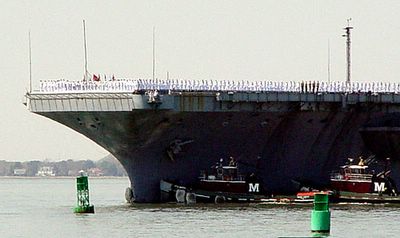
U.S. Navy sailors man the rails on the deck of the aircraft carrier USS Harry S. Truman, as tugboats push the ship toward the pier at Naval Station Norfolk, Va., April 18, 2005. The Truman spent four months in the Persian Gulf before returning home to Norfolk, after completing a scheduled six-month deployment in support of the Global War on Terrorism. Courtesy photo by Amanda Hoyle

English actress and model Kelly Brook has been named the sexiest woman in the world by men's mag FHM, beating Hollywood sex symbols such as Halle Berry and Angelina Jolie to claim the title.
Girls Aloud singer Cheryl Tweedy came second, pushing Lara Croft star Jolie into third place, followed by outgoing EastEnders actress Michelle Ryan.
Picking up her gong at the Britain's mag's star-studded bash, the beauty said: "No one from England ever wins this. It's always Jennifer Lopez or Britney Spears so I'm honoured."
Pregnant pop star Britney Spears, who topped the chart last year, was sixth in this year's poll.
Girls Aloud singer Cheryl Tweedy came second.
Other top ten beauties includes former 24 star Elisha Cuthbert (5), Sarah Harding (8), Beyonce Knowles (9) and Charlotte Church (10).
The 23-year-old was followed by former nurse Abi Titmuss, rising from 95th place last year.
Desperate Housewives actress Eva Longoria, who plays two-timing wife Gabrielle Solis in the TV series, was the highest new entry in the survey, which received three million votes from British readers of FHM magazine.
Brook, 25, who ranked 14th in last year's FHM poll of the 100 Sexiest Women, was one of six Britons in today's top 10, while homegrown stars Rachel Stevens (13th, also last year's winner),
Lara Croft star Jolie was pushed into third place.
Lara Croft star Jolie was pushed into third place.
former Brookside star Jennifer Ellison (17th) and actress Keira Knightly (18th) made it into the top 20.
FHM editor Ross Brown said: "The key to winning this competition is sex appeal and as our readers have overwhelmingly testified, Kelly certainly has it.
"Kelly Brook has always been an FHM favourite and it's fantastic to see her at the top of the list."
"There has been mass interest in the competition and the final list is a definitive guide to the world`s sexiest women.
The top 100 appears in the June edition of the men's magazine currently on sale.
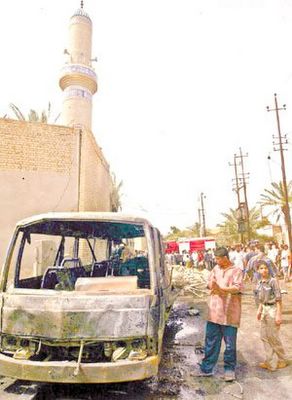
Iraqis look at a destroyed minibus at the site where a car bomb exploded outside a crowded Shiite mosque in Baghdad during Friday prayers, 22 April 2005. At least five people were killed and 25 wounded in the attack. Shiites, who form a majority in the country, won control of parliament in January's elections and are a target of choice for the largely Sunni driven insurgency. AFP PHOTO/ALI AL-SAADI
Attack Uptick Doesn't Undermine Progress
By Jim Garamone
American Forces Press Service
WASHINGTON, April 21, 2005 – It's difficult to know whether the uptick in attacks on Iraqi and coalition targets in Iraq is a trend or an aberration, said Pentagon spokesman Lawrence Di Rita today.
“Every commander we talked to in Iraq … believes that … the development of the Iraqi security forces is proceeding in an effective and appropriate fashion,” Di Rita said.
Intelligence is getting better and the ability to interdict attacks is getting better. Still, the enemy is running out of time. With the installation of an Iraqi government, the enemy can no longer say it is attacking an occupying force, he said. There are now almost 156,000 trained and equipped Iraqi security forces.
The number of attacks per day is in the 50 to 60 range. This is well down from the period just before Iraqi elections in January. However, the insurgents seem to be targeting innocent Iraqis rather than trying to go against coalition targets. Roughly half of all attacks inflict no or minimal damage.
Iraqis themselves are stepping forward and working to stop or disrupt attacks. “There’s a sense that the attackers recognize that they are increasingly being identified as people who are against what most Iraqis want, and so there will be a desire to grab headlines with more spectacular attacks,” Di Rita said.
Commanders are mindful of the pitfalls and the possible changes in enemy tactics. “But there isn’t a commander over there who doesn’t think there is progress and the Iraqi security forces are getting better,” he said.
Di Rita had little information on a helicopter crash today in Iraq that claimed the lives of six Americans. News reports said the six worked for Blackwater USA – a security firm based in North Carolina. The crash of the helicopter – chartered out of Bulgaria – also claimed the lives of three Bulgarian crewmembers and two Fijians. The flight was on its way to Tikrit from Baghdad when it appears to have been shot down, according to a Blackwater press release.
By Jim Garamone
American Forces Press Service
WASHINGTON, April 21, 2005 – It's difficult to know whether the uptick in attacks on Iraqi and coalition targets in Iraq is a trend or an aberration, said Pentagon spokesman Lawrence Di Rita today.
“Every commander we talked to in Iraq … believes that … the development of the Iraqi security forces is proceeding in an effective and appropriate fashion,” Di Rita said.
Intelligence is getting better and the ability to interdict attacks is getting better. Still, the enemy is running out of time. With the installation of an Iraqi government, the enemy can no longer say it is attacking an occupying force, he said. There are now almost 156,000 trained and equipped Iraqi security forces.
The number of attacks per day is in the 50 to 60 range. This is well down from the period just before Iraqi elections in January. However, the insurgents seem to be targeting innocent Iraqis rather than trying to go against coalition targets. Roughly half of all attacks inflict no or minimal damage.
Iraqis themselves are stepping forward and working to stop or disrupt attacks. “There’s a sense that the attackers recognize that they are increasingly being identified as people who are against what most Iraqis want, and so there will be a desire to grab headlines with more spectacular attacks,” Di Rita said.
Commanders are mindful of the pitfalls and the possible changes in enemy tactics. “But there isn’t a commander over there who doesn’t think there is progress and the Iraqi security forces are getting better,” he said.
Di Rita had little information on a helicopter crash today in Iraq that claimed the lives of six Americans. News reports said the six worked for Blackwater USA – a security firm based in North Carolina. The crash of the helicopter – chartered out of Bulgaria – also claimed the lives of three Bulgarian crewmembers and two Fijians. The flight was on its way to Tikrit from Baghdad when it appears to have been shot down, according to a Blackwater press release.
April 23, 2005
Release Number: 05-04-19
FOR IMMEDIATE RELEASE
IRAQI TIP TAKES DOWN TERRORISTS SUSPECTED OF HELO ATTACK
BAGHDAD, Iraq -- An Iraqi civilian helped Task Force Baghdad Soldiers find and apprehend six terrorists suspected of shooting down a civilian MI-8 helicopter April 21.
The Iraqi citizen told the Soldiers he knew where the blue KIA pickup truck the terrorists used during the attack was parked and led them to the site. When the Soldiers got there, several other local residents confirmed the first tip and showed the Soldiers where the terrorists lived.
Soldiers started to search two houses at 12:30 a.m. April 23. At the first house they captured three men and confiscated bomb-making material.
At the second house, the unit detained three more suspects involved in making improvised explosive devices.
All six men were taken into custody for questioning.
Release Number: 05-04-19
FOR IMMEDIATE RELEASE
IRAQI TIP TAKES DOWN TERRORISTS SUSPECTED OF HELO ATTACK
BAGHDAD, Iraq -- An Iraqi civilian helped Task Force Baghdad Soldiers find and apprehend six terrorists suspected of shooting down a civilian MI-8 helicopter April 21.
The Iraqi citizen told the Soldiers he knew where the blue KIA pickup truck the terrorists used during the attack was parked and led them to the site. When the Soldiers got there, several other local residents confirmed the first tip and showed the Soldiers where the terrorists lived.
Soldiers started to search two houses at 12:30 a.m. April 23. At the first house they captured three men and confiscated bomb-making material.
At the second house, the unit detained three more suspects involved in making improvised explosive devices.
All six men were taken into custody for questioning.
Friday, April 15, 2005

Secretary of Defense Donald H. Rumsfeld speaks to the troops after a town-hall meeting with U.S. and coalition forces in Kandahar, Afghanistan, on April 13, 2005. Rumsfeld visited Afghanistan during a tour of the middle-east including visits to Azerbaijan and Iraq, where he met with troops and key government officials including the newly-elected members of the Iraqi government. DoD photo by Tech. Sgt. Cherie A. Thurlby, U.S. Air Force.
Iraqi, U.S. Soldiers Detain More Than 65 Terrorists
Iraqi, U.S. Soldiers Detain More Than 65 Terrorists
By Spc. Emily J. Wilsoncroft, USA
Special to American Forces Press Service
FORWARD OPERATING BASE FALCON, Iraq, April 13, 2005 – Iraqi Army members teamed up with elements of 4th Brigade Combat Team, 3rd Infantry Division, for Operation Vanguard Tempest, an early-morning raid on the Baghdad neighborhood of al-Dora April 11.
Their mission? Hunt down nearly 90 known terrorist ringleaders – anti-Iraqi forces whose charges include donating money and supplies for the building of improvised explosive devices – and bring them back here to be detained and questioned.
The raid stood out as the first to name such a high number of targets as its goal.
“We’re going in to get these high-priority targets, and we’re trying to hit everyone at once,” said Sgt. 1st Class Stephon Garrett, a platoon sergeant with C Company, 3rd Battalion, 7th Infantry Regiment. “If we get them, it’ll be like finding the Holy Grail.”
“These guys are trying to kill Americans, Iraqi soldiers and Iraqi police,” added Pfc. Richard Kasserman, a company tank loader from Aiken, S.C. “It’s best to get them off the streets as soon as possible.”
At 3 a.m. soldiers began to move among the dimly lit and nearly silent rows of houses, taking care to stop only at those homes identified in the intelligence they had been given.
Upon entering the residences, they searched for evidence of the hunted person, and if there was none, questioned the occupants to glean any available information.
“So-and-so just moved away from here,” some would say, or, “I don’t know where so-and-so could be.”
Even though not every team was able to locate its assigned targets, most of the suspected terrorists accompanied the soldiers back to Falcon by the time the operation was over at 8:30 a.m.
Garrett, from Talladega, Ala., said he would have been happy with the capture of even one of the infamous criminals. “Even if we just save one person from an IED, I’ll feel it was a success,” he said. “We’ll be taking a lot of money out of a lot of terrorists’ hands.”
The operation’s success far exceeded that, though. At last count, the U.S. and Iraqi soldiers had detained at least 67 suspected terrorists, making the operation one of the largest conducted by Task Force Baghdad since 3rd Infantry Division taking over from 1st Cavalry Division in February.
“There are now criminals who are off the street for the time being,” said Capt. Raymond Hill, 184th Infantry Regiment’s 1st Battalion information operations officer. “It went well. … (The soldiers) have been trained to do this and I know they executed the missions well.”
Iraqi army elements who accompanied the U.S. soldiers played a crucial role in the operation, according to 1st Lt. Bryan Bonnema, the platoon leader of C Company’s 3rd Platoon.
“They are a great asset,” the Clifton, Va., native said. “They know the area and they know the culture. They are our intelligence on the ground, and they are definitely important. … I enjoy working with them.”
“The (Iraqi army’s) integrity and values have changed since the last time we were over here,” said 1st Sgt. Darren Woodland, the company’s first sergeant, from Fayetteville, N.C. “It used to be, they saw something they wanted and took it. Now, they see there’s a right way to do things, and that you have to treat people the way you want to be treated.”
Out of the hundreds of soldiers, both U.S. and Iraqi, who took part in the raid, none was hurt during the mission – a goal shared by everyone.
“Ultimately, we want to bring all our guys home and accomplish the mission,” Woodland said.
Sgt. 1st Class Thomas Tucker, platoon sergeant of the C Company’s 3rd platoon, agreed.
“If I got all my guys with me, safe and sound, that’s the biggest reward,” Tucker said. “If we get the bad guys, that’s good, too.”
(Army Spc. Emily J. Wilsoncroft is assigned to Task Force Baghdad Public Affairs Office.)
Related Site:
By Spc. Emily J. Wilsoncroft, USA
Special to American Forces Press Service
FORWARD OPERATING BASE FALCON, Iraq, April 13, 2005 – Iraqi Army members teamed up with elements of 4th Brigade Combat Team, 3rd Infantry Division, for Operation Vanguard Tempest, an early-morning raid on the Baghdad neighborhood of al-Dora April 11.
Their mission? Hunt down nearly 90 known terrorist ringleaders – anti-Iraqi forces whose charges include donating money and supplies for the building of improvised explosive devices – and bring them back here to be detained and questioned.
The raid stood out as the first to name such a high number of targets as its goal.
“We’re going in to get these high-priority targets, and we’re trying to hit everyone at once,” said Sgt. 1st Class Stephon Garrett, a platoon sergeant with C Company, 3rd Battalion, 7th Infantry Regiment. “If we get them, it’ll be like finding the Holy Grail.”
“These guys are trying to kill Americans, Iraqi soldiers and Iraqi police,” added Pfc. Richard Kasserman, a company tank loader from Aiken, S.C. “It’s best to get them off the streets as soon as possible.”
At 3 a.m. soldiers began to move among the dimly lit and nearly silent rows of houses, taking care to stop only at those homes identified in the intelligence they had been given.
Upon entering the residences, they searched for evidence of the hunted person, and if there was none, questioned the occupants to glean any available information.
“So-and-so just moved away from here,” some would say, or, “I don’t know where so-and-so could be.”
Even though not every team was able to locate its assigned targets, most of the suspected terrorists accompanied the soldiers back to Falcon by the time the operation was over at 8:30 a.m.
Garrett, from Talladega, Ala., said he would have been happy with the capture of even one of the infamous criminals. “Even if we just save one person from an IED, I’ll feel it was a success,” he said. “We’ll be taking a lot of money out of a lot of terrorists’ hands.”
The operation’s success far exceeded that, though. At last count, the U.S. and Iraqi soldiers had detained at least 67 suspected terrorists, making the operation one of the largest conducted by Task Force Baghdad since 3rd Infantry Division taking over from 1st Cavalry Division in February.
“There are now criminals who are off the street for the time being,” said Capt. Raymond Hill, 184th Infantry Regiment’s 1st Battalion information operations officer. “It went well. … (The soldiers) have been trained to do this and I know they executed the missions well.”
Iraqi army elements who accompanied the U.S. soldiers played a crucial role in the operation, according to 1st Lt. Bryan Bonnema, the platoon leader of C Company’s 3rd Platoon.
“They are a great asset,” the Clifton, Va., native said. “They know the area and they know the culture. They are our intelligence on the ground, and they are definitely important. … I enjoy working with them.”
“The (Iraqi army’s) integrity and values have changed since the last time we were over here,” said 1st Sgt. Darren Woodland, the company’s first sergeant, from Fayetteville, N.C. “It used to be, they saw something they wanted and took it. Now, they see there’s a right way to do things, and that you have to treat people the way you want to be treated.”
Out of the hundreds of soldiers, both U.S. and Iraqi, who took part in the raid, none was hurt during the mission – a goal shared by everyone.
“Ultimately, we want to bring all our guys home and accomplish the mission,” Woodland said.
Sgt. 1st Class Thomas Tucker, platoon sergeant of the C Company’s 3rd platoon, agreed.
“If I got all my guys with me, safe and sound, that’s the biggest reward,” Tucker said. “If we get the bad guys, that’s good, too.”
(Army Spc. Emily J. Wilsoncroft is assigned to Task Force Baghdad Public Affairs Office.)
Related Site:
Thursday, April 14, 2005
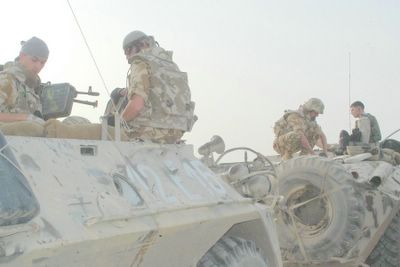
ARGHANDAB DISTRICT, Afghanistan Capt. Nicholas Bobrowski (far right) of the 7th Field Artillery Regiments 3rd Battalion and members of Romanias 300th Infantry Battalion prepare for a night mission in the mountains of Arghandab District, Afghanistan. The mission, part of Operation Iron Damper, is an ongoing effort to provide security and stability in the region by working closely with village elders to capture anti-coalition militia (ACM) or keep them on the move. (Photo by U.S. Army Spc. Claudia K. Bullard, 105th Mobile Public Affairs Detachment)
<../Photos/050404-A-1888A-046.jpg> <../Photos/050404-A-1888A-046.jpg> ARGHANDAB DISTRICT, Afghanistan U.S. Army and Afghan National Army personnel visit with local elders about the security situation in their village. The Soldiers were participating in Operation Iron Damper, a continuing effort by Coalition Forces to build stability and security in the region. (Photo by U.S. Army Spc. Johnny Aragon, 55th Signal Company) <../Photos/050321-F-9429S-031.jpg> <../Photos/050321-F-9429S-031.jpg> KARSHI-KHANABAD AIR BASE, Uzbekistan - U.S. Army Spc. Ben Jamieson, a parachute rigger with 24th the Quartermaster Co. from the Southern European Task Force at Vicenza, Italy, checks over parachutes on Container Deployment System bundles he and other Soldiers built. ( Photos by Tech. Sgt. Scott T. Sturkol 416th Air Expeditionary Group Public Affairs)

Coalition forces from the 3rd Battalion, 7th Regiment Field Artillery, Schofield Barracks, Hawaii walked through Shah Wali Ko District, Afghanistan speaking with the local villages and providing a show of force to interupt Taliban attempts to establish themeselves in the area on April 4-5, 2005. (Released) (Army photo by SPC Johnny R. Aragon)
U.S., Libya in high-level oil talks
Libya and the United States are conducting high-level energy cooperation talks.
The United States has been represented by Assistant Secretary of State for Economic Affairs Paul Simmons in the talks which began on April 10. Simmon and senior Libyan officials are discussing bilateral oil and gas development.
So far, Simmons has met with Libyan Energy Minister Fathi Bin Shatwan and Economic and Trade Minister Abdul Qader Khair, Middle East Newsline reported. The talks were said to have explored joint investments to develop Libya's oil industry.
In 2004, Libya awarded U.S. firms most of the oil exploration and development contracts. Tripoli has designated the United States as its main partner to increase Libyan oil production to three million barrels per day by 2010.
The United States has been represented by Assistant Secretary of State for Economic Affairs Paul Simmons in the talks which began on April 10. Simmon and senior Libyan officials are discussing bilateral oil and gas development.
So far, Simmons has met with Libyan Energy Minister Fathi Bin Shatwan and Economic and Trade Minister Abdul Qader Khair, Middle East Newsline reported. The talks were said to have explored joint investments to develop Libya's oil industry.
In 2004, Libya awarded U.S. firms most of the oil exploration and development contracts. Tripoli has designated the United States as its main partner to increase Libyan oil production to three million barrels per day by 2010.

AR RAMADI, Iraq (April 2, 2005) ?Twenty-year-old Cole E. Young, combat engineer, Company A, 1st Combat Engineer Battalion, of Green Bay, Wis., uses his metal detector to search for weapons and suspicious metals in a warehouse on the outskirts of the city here. Marines with 4th Platoon, Company B, 1st Battalion, 5th Marine Regiment and leathernecks of Company A, 1st Combat Engineer Battalion teamed up and discovered four 120 mm shells, a 155 mm shell; several live and empty 7.62 rounds, explosive detonation cord, a live fragmenting grenade and one rocket launcher during a five-hour search conducted on several acres of farmland along the banks of the Euphrates River on the edge of the city. Photo by Cpl. Tom Sloan

Corporal Gregory Hollins, rescueman, Aircraft, Rescue and Firefighting watches closely as a CH-53 Super Stallion lands aboard forward armed refueling point Al Qaim, Iraq, March 27. Hollins is one of four crash crewman who are responsible for all aircraft and structural fire defense in Al Qaim.Photo by: Cpl. C. Alex Herron

Babil Province, Iraq (March 25, 2005) Members of Iraqi National Guard along with escorts from 2-114 Field Artillery Battalion of 155 Brigade Combat Team and 2 members form the Navy Explosive Ordnance Disposal Unit (EOD) locate weapons caches after conducting raids near Forward Operating Base Dogwood. This was a joint mission with the ING and 155 BCT that resulted in the capture of over 25 suspected insurgent participants along with various weapon caches. U.S. Navy Photo by Photographer's Mate 1st Class (AW) Brien Aho, Fleet Combat Camera, Atlantic

BAGHDAD, Iraq (From left to right) Airman 1st Class Jeffrey Winters, Staff Sgt. Bradley Hayes and Airman 1st Class Frederick Lukasek, all of the 447th Expeditionary Logistics Readiness Squadron, fold a flag flown in honor of Staff Sgt. Scott Sather, the fallen combat controller for whom Sather Air Base is named. The flag was flown during a rededication ceremony here April 8 and will be sent to Sergeant Sathers family. (U.S. Air Force photo by Staff Sgt. Eric Petosky)
hi-res
Yemen finishes off Iran-backed insurgents
Yemen finishes off Iran-backed insurgents
SPECIAL TO WORLD TRIBUNE.COM
Tuesday, April 12, 2005
Yemen's military said the have routed Iranian-backed insurgents in an offensive near the Saudi border.
For the fifth straight day, Yemeni main battle tanks and artillery pounded strongholds of the Believing Youth movement in the Saada province.
Yemeni government sources said special forces units raided several hideouts of the Shi'ite insurgency group in the area of Razamat about 240 kilometers north of Sanaa as dozens of fighters surrendered.
SPECIAL TO WORLD TRIBUNE.COM
Tuesday, April 12, 2005
Yemen's military said the have routed Iranian-backed insurgents in an offensive near the Saudi border.
For the fifth straight day, Yemeni main battle tanks and artillery pounded strongholds of the Believing Youth movement in the Saada province.
Yemeni government sources said special forces units raided several hideouts of the Shi'ite insurgency group in the area of Razamat about 240 kilometers north of Sanaa as dozens of fighters surrendered.
Wednesday, April 13, 2005

BAGHDAD, IRAQ - JANUARY 21: US soldiers guard the scene of a car bomb explosion that targeted a Shiite mosque on January 21, 2005 south west of Baghdad, Iraq. The blast, which killed 14 people and injured at least 40 more, exploded in front of a Shia mosque where Shiite worshippers were celebrating the Eid al-Adha holiday also known as the Feast of Sacrifice. (Photo by Wathiq Khuzaie/Getty Images)






